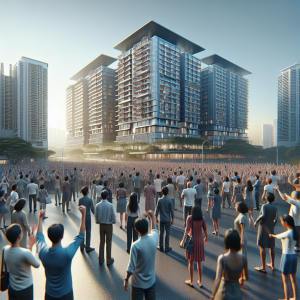Singapore’s retail sales have taken a notable downturn, extending their decline for the second consecutive month with a 2.9% dip recorded in December 2024. This trend raises concerns among economists and retailers alike, reflecting broader economic challenges that may be affecting consumer behavior in the city-state.
The latest data indicates that the decline in retail sales comes on the heels of a 3.1% decrease noted in November, suggesting a sustained period of reduced consumer spending. Analysts point to a combination of factors contributing to this downturn, including rising inflation, changing consumer preferences, and the lingering effects of global economic uncertainties. The interconnected nature of global markets means that trends observed in larger economies, such as the United States, can have significant repercussions for Singapore’s retail landscape. For instance, recent reports from the U.S. indicated sharp declines in retail sales during specific months, which could signal a shift in consumer confidence that resonates globally.
In Singapore, the retail sector has been grappling with challenges that extend beyond mere sales figures. The importance of comprehensive economic reporting is underscored by the current situation, as timely access to data is crucial for businesses and policymakers alike. Any disruptions in data accessibility can hinder informed decision-making, particularly in a tech-driven economy like Singapore’s. This highlights the need for robust digital infrastructure to ensure that stakeholders can access real-time economic data without interruption.
Moreover, the role of taxation in shaping retail sales cannot be overlooked. Tax policies directly influence consumer spending and business operations, and understanding the contributions of different sectors to taxable retail sales is vital. As the government considers adjustments to fiscal policies, the retail sector’s performance will likely be a key consideration, especially in light of the recent sales declines.
Consumer Confidence and Future Outlook
The decline in retail sales raises questions about consumer confidence moving forward. As inflation continues to affect purchasing power, consumers may become more cautious in their spending habits. This shift can lead to a further contraction in retail sales unless addressed through targeted economic measures. Retailers may need to adapt their strategies, focusing on enhancing customer experience and offering value-driven products to entice hesitant shoppers.
Looking ahead, it is essential for stakeholders in Singapore’s retail sector to monitor these trends closely. The potential for recovery exists, but it will depend on a combination of factors including economic stability, consumer confidence, and effective government policies. As the global economy continues to evolve, Singapore’s retail landscape will need to be agile and responsive to both local and international changes.
In conclusion, the recent 2.9% decline in retail sales for December is a clear indication of the challenges facing Singapore’s economy. As consumers navigate a complex economic environment, understanding the underlying factors driving these trends will be crucial for retailers and policymakers alike. The path to recovery may be fraught with obstacles, but a strategic approach focused on data accessibility, consumer engagement, and adaptive policies could pave the way for a more resilient retail sector in Singapore.





